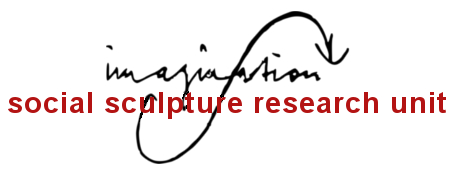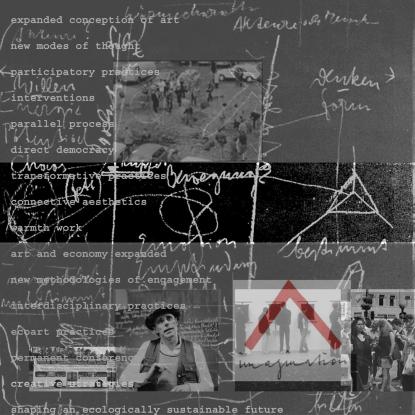The Masters in Social Sculpture is one of four taught, Interdisciplinary Arts programmes at Oxford Brookes University. It is open to students from all backgrounds with undergraduate degrees or equivalent experience.
It offers practitioners, from arts and non-arts backgrounds, the unique opportunity of developing transdisciplinary, ecologically focused aIt offers practitioners, from arts and non-arts bacnd socially engaged work, informed by an engagement with the work of contemporary social sculpture practitioners as well as in relation to Joseph Beuys and related thinkers and practitioners.
A HOLISTIC APPROACH TOWARDS A SUSTAINABLE FUTURE
Philosophies and transdisciplinary practices related to social sculpture are explored. These include:
- participatory and socially engaged practices
- connective aesthetics
- cross artform work
- environmental and ecological art
- interventionist actions
- phenomenological and eco-philosophies
- direct democracy processes
- forms of work and finance toward a sustainable future.
Students explore different modes of thinking, new strategies and methodologies of engagement and the social sculpture ideas through their own practice. Their evolving practice benefits from its close proximity to the research culture of the Social Sculpture Research Unit, in whose forums, projects and presentations the masters’ students participate.
MORE ABOUT THE COURSE
The histories, philosophies and practices of social sculpture are studied in a specialist Social Sculpture module alongside a Creative Strategies module, which is shared by all four programmes.
Students also undertake self-determined, practice-based research that incorporates appropriate theory, and forms the basis for their practice-based, final Major Project.
DIALOGUE, FEEDBACK AND TUTORIAL SUPPORT
Students and tutors meet regularly in an MA FORUM to discuss work and relevant issues.
All programmes involve a unique approach to ‘feedback’ and share an emphasis on location, context and audience.
Concern with context and methods of engagement creates a common thread for the annual ‘festival’ of MA work, which presents the Major Project work to a wider public.
Social sculpture students may negotiate to link their Major Project to their home context. Students may elect to have tutorials on their own or in small groups.
The MA in Social Sculpture can be taken full time over one calendar year (Sept – Sept) or part time over two years (two year option advised)
IT OFFERS:
- A unique opportunity to explore and participate in the field of social sculpture and to consider the relevance of social sculpture ideas and practices for our work toward an ecologically viable and humane future
- Insight into the roots of social sculpture in the work of Joseph Beuys, Goethe, Steiner and Schiller, as well as its relationship to Jungians like Hillman and Moore, and to other innovators with similar concerns and ideas like Tagore and Gandhi
- An engagement with phenomenological thinking in both theory and practice
- A space for experimentation and reflection
- A specialist research unit that is linked to an international community of practitioners, activists and thinkers
- Excellent teaching by practitioners involved in social sculpture and related practices (see www.exchange-values.org)
- Exchanges with the Bauhaus University, in Weimar, Germany
- 24 hour/365 day access to excellent facilities
- We welcome visits from prospective students and will do telephone interviews for international students.
FOR MORE INFORMATION PLEASE CONTACT:
Prof. Shelley Sacks
Tel: +44 (0) 1865 484961
Email: ssacks@brookes.ac.uk
School of Arts, Oxford Brookes University, Headington, Oxford, OX3 0BP
https://www.brookes.ac.uk/courses/postgraduate/social-sculpture/


